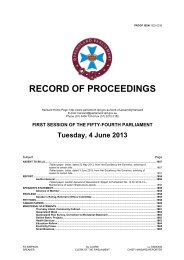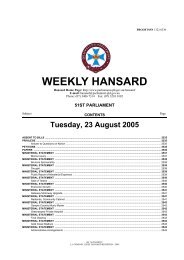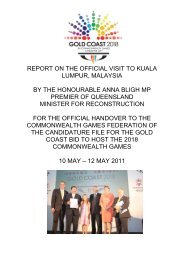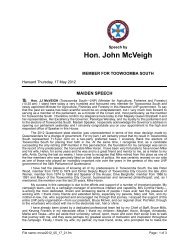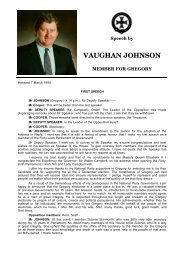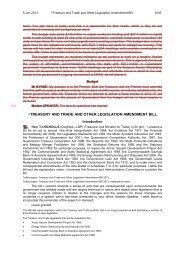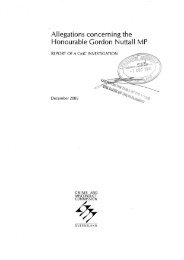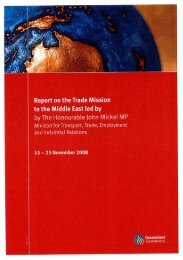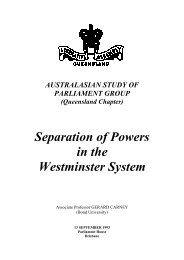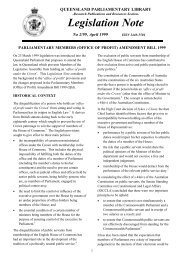Full transcript - Final - Queensland Parliament - Queensland ...
Full transcript - Final - Queensland Parliament - Queensland ...
Full transcript - Final - Queensland Parliament - Queensland ...
You also want an ePaper? Increase the reach of your titles
YUMPU automatically turns print PDFs into web optimized ePapers that Google loves.
360 Land and Resources Tribunal Bill 9 Mar 1999<br />
underpinned by negotiation. It was a<br />
fundamental shift that allowed the<br />
Government to get all interested stakeholders<br />
involved in developing a process for future<br />
development activity. That was significant, as it<br />
was the first time all parties had been brought<br />
together anywhere in Australia to find a<br />
cooperative solution to the conflict that had<br />
surrounded native title for so long. It was three<br />
months of intense consultation and<br />
negotiation, but finally we formulated a<br />
response that was built on the principles of<br />
acknowledging native title rights and giving<br />
industry a clear, less costly and less time<br />
consuming process. That led to the<br />
development of three pieces of legislation<br />
which would underpin the new native title<br />
regime. These are the Native Title<br />
(<strong>Queensland</strong>) State Provisions Act, the Native<br />
Title (<strong>Queensland</strong>) State Provisions<br />
Amendment Act (No. 2) and the Land and<br />
Resources Tribunal Bill. I will speak in detail<br />
about the Land and Resources Tribunal Bill in<br />
a moment, but I think it is important that I put<br />
the whole package in perspective by<br />
explaining a bit about the first two pieces of<br />
legislation.<br />
In line with the Commonwealth<br />
amendments, the Beattie Government's first<br />
piece of legislation passed in September<br />
confirmed the extinguishment of native title on<br />
all tenures granting exclusive possession as<br />
per the detailed schedule included in the<br />
amended Federal legislation. It also<br />
guaranteed the validity of the intermediate<br />
period land management actions taken by the<br />
State between 1 January 1994, when the<br />
national Native Title Act began, and 23<br />
December 1996, when the Wik judgment was<br />
handed down. This gave pastoralists,<br />
fishermen, miners and other leaseholders<br />
complete security that their tenures were<br />
legally valid. This Act also made it clear that<br />
native title holders whose rights and interests<br />
were extinguished were entitled to<br />
compensation. Negotiations are continuing<br />
between <strong>Queensland</strong> and the Commonwealth<br />
to secure financial assistance in paying this<br />
compensation.<br />
The second Act goes to the heart of<br />
native title management in future mining in<br />
<strong>Queensland</strong>. Finding a way through the<br />
impasse which had stalled activity in the<br />
mining industry—a major driving force of the<br />
<strong>Queensland</strong> economy—was and remains<br />
critical to the Government's stated No. 1<br />
priority of job creation. However, we also<br />
recognised that mining activity, particularly<br />
large-scale development, could profoundly<br />
affect native title rights and interests. The<br />
legislation, which was passed by this<br />
<strong>Parliament</strong> in November, promotes negotiation<br />
over litigation. It sets out clearly a number of<br />
detailed processes to apply in different<br />
circumstances, depending on the type of<br />
activity proposed and the type of land tenure<br />
involved. For instance, some exploration<br />
activity has minimal impact on land and water.<br />
In those cases, the legislation provides for a<br />
simpler, faster process with an obligation on<br />
developers to consult traditional owners.<br />
For a major development that has the<br />
potential to impact seriously on native title<br />
interests there are a range of procedures to be<br />
followed. These include a limited right to<br />
negotiate for native title holders on most land<br />
and a full right to negotiate on unallocated<br />
State land. The requirement for proper<br />
notification and negotiation in each case is set<br />
out in detail, with the maximum time for any<br />
proposal to be finally determined set at 12<br />
months. There are built-in provisions to militate<br />
against any attempts to stall or subvert<br />
negotiations. This second piece of legislation<br />
also provided for the establishment of an<br />
independent tribunal to make final<br />
determinations on whether a mining activity<br />
should proceed in cases where negotiation<br />
fails to secure agreement between the native<br />
title holders and the miner.<br />
As part of the package of legislation<br />
dealing with native title, the Land and<br />
Resources Tribunal Bill was introduced to this<br />
<strong>Parliament</strong> in November to meet the Federal<br />
requirement for an independent tribunal. The<br />
tribunal will absorb the functions of the Mining<br />
Wardens Court, as well as taking on<br />
responsibility for native title matters, including<br />
hearing objections, making determinations and<br />
ruling on compensation where there is any<br />
dispute. It will be headed by a president at the<br />
level of a Supreme Court judge, with two<br />
deputies at District Court judge level. All<br />
presiding members must have particular<br />
knowledge or experience of indigenous issues.<br />
The independence of the presiding members<br />
will be upheld by aligning their tenure, pension<br />
and leaves of absence to that of the judiciary.<br />
Tribunal members will be assisted by<br />
three referees, one of whom will be<br />
indigenous, with specific expertise in certain<br />
areas but without voting rights on the tribunal.<br />
The indigenous referee will advise on cultural<br />
heritage and indigenous issues, which will<br />
ensure that the tribunal observes sensitivity<br />
and confidentiality in its dealings with native<br />
title holders. This referee will also focus on<br />
specific processes for dealing with the cultural<br />
heritage aspects of any application. The<br />
indigenous referee, like the other two referees,



